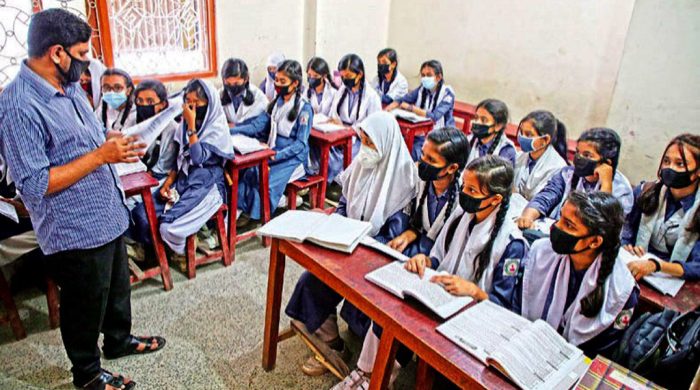Low teacher pay harms education

- Update Time : Sunday, December 8, 2024
- 8 Time View

Teachers continue to go underpaid compared with their fellows in other Asian countries which squarely affects the quality of education, the white paper on the state of the Bangladesh economy says.
The average salary of a primary school teacher is about 27 per cent less than the average monthly per capita income and the low pay demotivates some university teachers to carry out research.
If teachers fail to maintain a modest standard of living with their salary, they cannot be expected to produce an optimum level of intellectual output, states the white paper.
Skilled and meritorious teachers, especially at the elementary level, are a must to build the foundation of quality education, educationsists observed.
Teachers should be paid the highest salaries and dignities, they said, urging the interim government to reform the sector bypassing partisan opinions.
A 12-member committee headed by economist Debapriya Bhattacharya prepared the white paper and submitted it to chief adviser Muhammad Yunus on December 1.
In a section titled Career Mobility for Teachers, the white paper highlights that the government is responsible for ensuring primary education for all. Primary education was made compulsory in the country in 1993.
The white paper states that the average salary of a primary school teacher in Bangladesh is $170.02, about 27 per cent less than the average monthly per capita income of the country.
The monthly per capita income of Bangladesh is $232 as the Bangladesh Bureau of Statistics shows the annual per capita income of Bangladesh at $2784 in the financial year 2023-24.
The average monthly salary of a primary school teacher is $953.13 in Maldives, $284.64 in India, $250.44 in Sri Lanka, $206.07 in Pakistan and $189.22 in Myanmar, the white paper shows.
‘In terms of primary school teachers’ salaries, Bangladesh ranks 45th among Asian countries and 7th in South Asia,’ it read, adding, ‘in our national pay scale, primary school teachers are placed at a very low level.’
The paper also shows that an entry-level teacher or lecturer at universities in Bangladesh earns between $220 and $482 per month which, in contrast, ranges $770 to $2,420 in India, $700 to $2,800 in Malaysia and $2,950 to $10,300 in Singapore.
‘Higher salaries, allowances and dignities for the teachers must be ensured for quality education,’ said Rasheda K Choudhury, executive director of the Campaign for Popular Education.
She also said that the government should introduce cadre-facility in the primary education level to attract skilled and meritorious students in the teaching profession.
BRAC University distinguished professor Mohammad Kaykobad said tha without quality teachers it would not be possible to sustain in the current world.
For quality teachers, they should be paid well, he added.
‘Highest salary should be paid to the teachers from the elementary level to the basic level till Class XII to ensure quality of education,’ said Quazi Faruque Ahmed, a member of the Education Policy 2010 formulation committee.
The government should reform this sector bypassing all partisan opinions, said Quazi Faruque, also member of the Asia-South Pacific Association for Basic and Education Capacity Support.
An assistant teacher at government primary schools in the country receives about Tk 19,000 in monthly salary under the 13th grade of national pay scale, the white paper mentions.
Studies show that the monthly food expense for a family of four in Dhaka is Tk 22,664 which is too high for a primary school teacher to manage.
Kaykobad also said that the tendency to appoint unskilled teachers with much lower salary at the whim of some private schools also severely affected the quality of education.
The primary school teachers are still paid according to the national pay scale 2015, with no adjustment for the inflation which stands at more than 9 per cent after sharp increases in the past couple of years.
The low pay also demotivates some teachers from allocating much time to the university while some even stop research after becoming a professor.
‘It is to be noted that, the culture of political criminalisation in the educational institutions has a much deeper social effect, as these teachers will be there for teaching for the next 30 years or so,’ the white paper continues.
The whole culture has been nurtured in such a way that the collusive political and bureaucratic decision making process overruled the social dignity of teachers, it says.
Teaching is a profession that, the report adds, needs a certain salary without any comparison with other professions.















